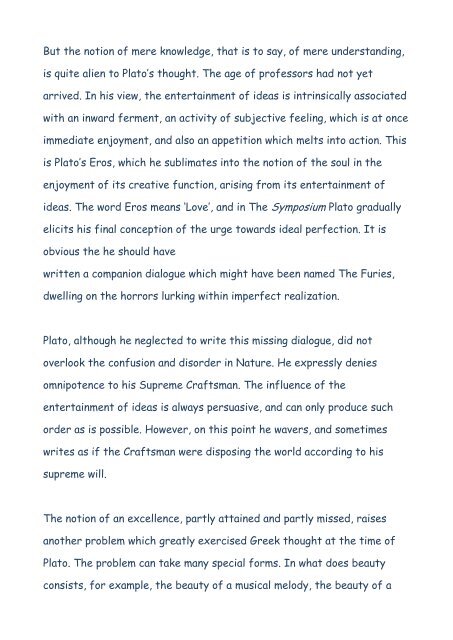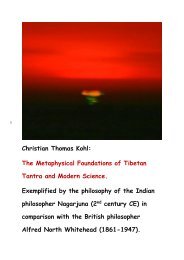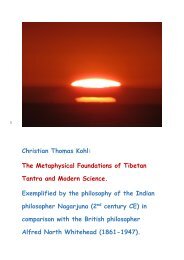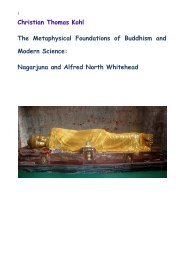The Metaphysical Foundation of Buddhism and Modern Science
The Metaphysical Foundations of Buddhism and Modern Science: Nagarjuna and Alfred North Whitehead
The Metaphysical Foundations of Buddhism and Modern Science: Nagarjuna and Alfred North Whitehead
Create successful ePaper yourself
Turn your PDF publications into a flip-book with our unique Google optimized e-Paper software.
But the notion <strong>of</strong> mere knowledge, that is to say, <strong>of</strong> mere underst<strong>and</strong>ing,<br />
is quite alien to Plato’s thought. <strong>The</strong> age <strong>of</strong> pr<strong>of</strong>essors had not yet<br />
arrived. In his view, the entertainment <strong>of</strong> ideas is intrinsically associated<br />
with an inward ferment, an activity <strong>of</strong> subjective feeling, which is at once<br />
immediate enjoyment, <strong>and</strong> also an appetition which melts into action. This<br />
is Plato’s Eros, which he sublimates into the notion <strong>of</strong> the soul in the<br />
enjoyment <strong>of</strong> its creative function, arising from its entertainment <strong>of</strong><br />
ideas. <strong>The</strong> word Eros means ‘Love’, <strong>and</strong> in <strong>The</strong> Symposium Plato gradually<br />
elicits his final conception <strong>of</strong> the urge towards ideal perfection. It is<br />
obvious the he should have<br />
written a companion dialogue which might have been named <strong>The</strong> Furies,<br />
dwelling on the horrors lurking within imperfect realization.<br />
Plato, although he neglected to write this missing dialogue, did not<br />
overlook the confusion <strong>and</strong> disorder in Nature. He expressly denies<br />
omnipotence to his Supreme Craftsman. <strong>The</strong> influence <strong>of</strong> the<br />
entertainment <strong>of</strong> ideas is always persuasive, <strong>and</strong> can only produce such<br />
order as is possible. However, on this point he wavers, <strong>and</strong> sometimes<br />
writes as if the Craftsman were disposing the world according to his<br />
supreme will.<br />
<strong>The</strong> notion <strong>of</strong> an excellence, partly attained <strong>and</strong> partly missed, raises<br />
another problem which greatly exercised Greek thought at the time <strong>of</strong><br />
Plato. <strong>The</strong> problem can take many special forms. In what does beauty<br />
consists, for example, the beauty <strong>of</strong> a musical melody, the beauty <strong>of</strong> a


















